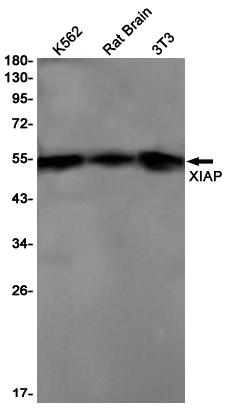
| WB | 1/500-1/1000 | Human,Mouse,Rat |
| IF | 咨询技术 | Human,Mouse,Rat |
| IHC | 咨询技术 | Human,Mouse,Rat |
| ICC | 技术咨询 | Human,Mouse,Rat |
| FCM | 咨询技术 | Human,Mouse,Rat |
| Elisa | 咨询技术 | Human,Mouse,Rat |
| Aliases | API3; ILP1; MIHA; XLP2; BIRC4; IAP-3; hIAP3; hIAP-3 |
| Entrez GeneID | 11798 |
| WB Predicted band size | Calculated MW: 56 kDa; Observed MW: 53 kDa |
| Host/Isotype | Rabbit IgG |
| Antibody Type | Primary antibody |
| Storage | Store at 4°C short term. Aliquot and store at -20°C long term. Avoid freeze/thaw cycles. |
| Species Reactivity | Human,Mouse,Rat |
| Immunogen | Recombinant protein of mouse XIAP |
| Formulation | Purified antibody in TBS with 0.05% sodium azide,0.05%BSA and 50% glycerol. |
+ +
以下是关于XIAP抗体的3篇代表性文献,涵盖其功能、应用及临床研究:
---
1. **文献名称**:*XIAP: Apoptotic brake and promising therapeutic target*
**作者**:LaCasse, E.C., et al.
**摘要**:该综述系统总结了XIAP通过抑制caspase-3/7/9调控细胞凋亡的分子机制,强调其作为癌症治疗靶点的潜力,并讨论了基于XIAP抗体的拮抗剂(如小分子抑制剂和单克隆抗体)在增强肿瘤细胞化疗敏感性中的应用。
2. **文献名称**:*Targeting XIAP for the treatment of malignancy*
**作者**:Fulda, S., et al.
**摘要**:研究通过XIAP抗体检测多种癌细胞系中XIAP的过表达,证明其与化疗耐药性正相关。实验显示,联合使用XIAP抗体与化疗药物可显著诱导肿瘤细胞凋亡,为临床联合疗法提供了依据。
3. **文献名称**:*The X-linked inhibitor of apoptosis protein (XIAP) is a prognostic marker in colorectal cancer*
**作者**:Tamm, I., et al.
**摘要**:利用XIAP特异性抗体对结直肠癌组织进行免疫组化分析,发现XIAP高表达与患者生存率低及肿瘤转移风险升高相关,提示其可作为预后评估的生物标志物和潜在治疗靶点。
---
这些文献从基础机制、治疗策略到临床转化多角度阐述了XIAP抗体的应用价值。如需具体文章细节,建议通过PubMed或Web of Science检索DOI获取全文。
XIAP (X-linked inhibitor of apoptosis protein) is a member of the inhibitor of apoptosis protein (IAP) family, known for its role in regulating programmed cell death (apoptosis) and cellular signaling pathways. Encoded by the *BIRC4* gene on the X chromosome, XIAP functions primarily by binding to and inhibiting caspase-3. -7. and -9. key enzymes in the apoptotic cascade. Beyond apoptosis suppression, XIAP participates in modulating inflammatory responses, NF-κB signaling, and ubiquitin-mediated protein degradation via its RING domain.
XIAP's overexpression is linked to cancer progression, chemoresistance, and poor prognosis, making it a therapeutic target. Conversely, mutations or deficiencies in XIAP are associated with X-linked lymphoproliferative syndrome type-2 (XLP-2), a rare immunodeficiency disorder.
XIAP-specific antibodies are essential tools in research and diagnostics. They enable the detection of XIAP expression in tissues or cells through techniques like Western blotting, immunohistochemistry, and flow cytometry. These antibodies also aid in studying XIAP's interactions with caspases, ubiquitin ligase activity, and its role in disease mechanisms. Therapeutic XIAP-targeting antibodies or small molecules are under investigation to either block its anti-apoptotic function in cancers or restore immune regulation in XIAP deficiency disorders.
Overall, XIAP antibodies bridge fundamental research and clinical applications, offering insights into cell survival mechanisms and therapeutic strategies.
×